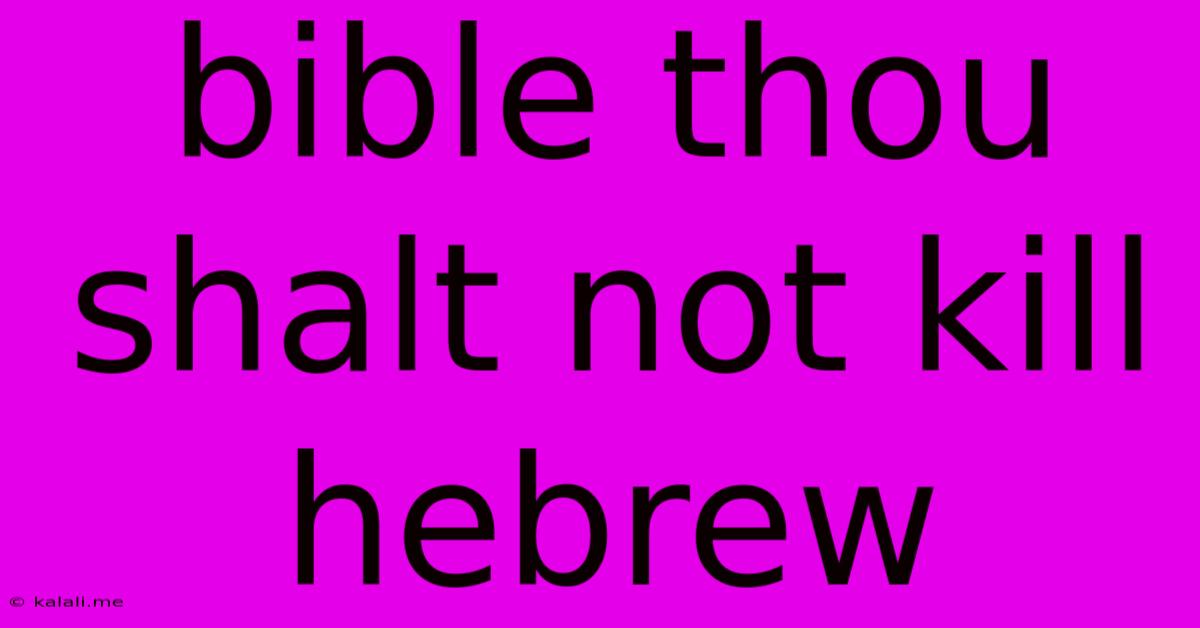Bible Thou Shalt Not Kill Hebrew
Kalali
May 30, 2025 · 3 min read

Table of Contents
Thou Shalt Not Kill: A Deep Dive into the Hebrew of Exodus 20:13
The sixth commandment, "Thou shalt not kill," is one of the most well-known and debated passages in the Bible. Understanding its nuances requires exploring the original Hebrew text of Exodus 20:13, where it's often translated as לֹא תִּרְצָח (lo tirtzach). This seemingly simple phrase holds layers of meaning that have been interpreted and reinterpreted throughout history. This article delves into the Hebrew word ratzach (רָצַח) and its implications for understanding this crucial ethical precept.
The Hebrew Word Ratzach (רָצַח): More Than Just Killing
The common English translation, "kill," can be misleading. While ratzach does encompass the act of taking a life, it carries a stronger connotation than simply causing death. It specifically refers to unlawful, premeditated murder. This is a crucial distinction. Accidental deaths, justifiable killings in self-defense, or even killings in warfare are not necessarily encompassed by this prohibition.
The root of the word, r-t-ch, suggests an act of violence, aggression, and malice. It's not simply about the cessation of life but the deliberate and wrongful ending of it, motivated by wickedness or malevolence. This is supported by other uses of the word ratzach throughout the Hebrew Bible.
Contextual Understanding within the Decalogue
The commandment appears within the context of the Ten Commandments (Decalogue), a set of ethical and religious principles forming the basis of Jewish and Christian morality. Understanding the commandment within this context highlights its emphasis on respect for human life and the sanctity of God's creation. It's not simply a legal prohibition but a moral imperative rooted in a deep theological understanding of humanity's relationship with God.
Interpretations and Debates Throughout History
The interpretation of lo tirtzach has varied throughout history. Some interpretations have focused on the literal meaning, emphasizing the absolute prohibition of taking any human life. Others have attempted to reconcile the commandment with instances of violence described in the Bible itself, such as divinely ordained wars or capital punishment. This has led to ongoing debates and discussions on the ethical implications of war, self-defense, and capital punishment in relation to this commandment.
The Broader Implications of the Commandment
The commandment's impact extends far beyond literal murder. Many scholars and theologians argue that it encompasses a wider range of actions that indirectly violate the sanctity of human life. This could include:
- Hate speech and actions that incite violence: These can create an environment where murder becomes more likely.
- Negligence and indifference leading to death: Failing to provide necessary care or taking actions that knowingly endanger human life can be seen as a violation of the spirit of the commandment.
- Exploitation and oppression: Systems and actions that dehumanize individuals and deprive them of their basic rights ultimately contribute to a culture that tolerates violence and murder.
In conclusion, the Hebrew of Exodus 20:13 – lo tirtzach – is far richer and more nuanced than a simple "Thou shalt not kill." It speaks to the sacredness of human life, the importance of justice, and the profound moral responsibility to uphold the value of each individual. Understanding the original Hebrew helps us grasp the depth and breadth of this crucial commandment, prompting reflection on its enduring relevance in today's world. The commandment's enduring power lies not just in its prohibition of murder, but in its call for a just and compassionate society that cherishes human life in all its forms.
Latest Posts
Latest Posts
-
How To Redefine A Valu In A Set
May 31, 2025
-
How Many Amps Does A Ceiling Fan Use
May 31, 2025
-
What Is A Single Outlet Circuit
May 31, 2025
-
Is It Normal For Water To Come Out Of Exhaust
May 31, 2025
-
My Car Is In The Garage
May 31, 2025
Related Post
Thank you for visiting our website which covers about Bible Thou Shalt Not Kill Hebrew . We hope the information provided has been useful to you. Feel free to contact us if you have any questions or need further assistance. See you next time and don't miss to bookmark.